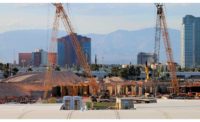This year’s ENR Southwest Top Specialty Contractors survey includes input from more than 45 regional firms with combined revenue surpassing $1.5 billion. According to some of the participating firms, success today often requires utilizing the latest advances in technology, along with savvy outreach.
“Technology has created a means for us to discover problems before they exist and we are able to clear constraints so we can be more productive,” says Ed White, executive vice president with TDIndustries. “The use of BIM, as well as handheld technology, has been and will be instrumental for more complex projects.”
|
Click Here to Southwest's 2016 Top Specialty Contractors |
Determining return on investment for technology, however, is difficult for specialty contractors.
“One challenge we face is knowing which new tech products to buy for our needs and how much we should be spending,” says Marj Weber, CFO and treasurer of Irontree Construction. “Sometimes we’ll invest in a software or tech product and have certain expectations, but then the product doesn’t perform the way we had anticipated. Technology is a challenge as a small contractor.”
The use of unmanned aerial vehicles, or drones, remains a pivot point for several innovations, says Kevin Somerville, vice president of business development at Buesing Corp..
“Our two drones help us to bid work and understand site conditions,” Somerville says, adding that Buesing uses them for photos and topographic mapping.
“We are constantly looking at creative ways to prefab or use alternative materials to be more productive and limit our safety exposure on jobsites,” says Tom Thomas, TDIndustries project manager. Using press fittings on copper systems increases productivity, he says.
“For instance, on Yuma Regional Medical Center we converted large domestic water mains into stainless in lieu of copper,” Thomas says. “Not only did we save the customer money, we saved time on the install.”
Labor shortages continue to be a factor, says Weber with Irontree. “Our office is well staffed, but we are having a hard time finding skilled journeymen and project foremen because those positions carry a lot of responsibility,” he says. “Through a new ad strategy we are doing our best to push forward the advantages of coming to work for Irontree Construction.”
The company has “raised wages significantly and improved benefits,” Weber adds, while also encouraging continued education and training and maintaining good communication with employees.
But the need for quality workers is unlikely to go away.
“There seems to always be labor shortages in our industry,” White says.






Post a comment to this article
Report Abusive Comment